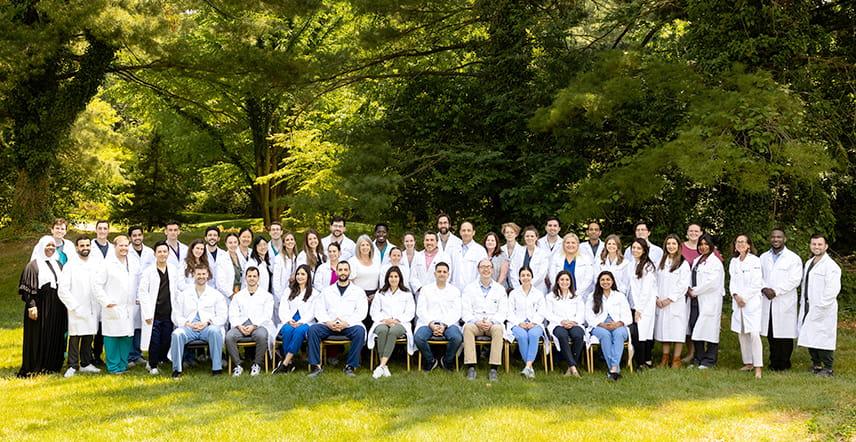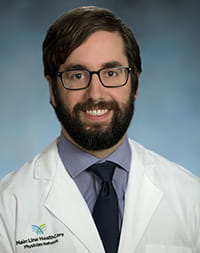Internal Medicine Residency Program

About the Internal Medicine Residency Program
The Internal Medicine Residency Program at Lankenau Medical Center began over 70 years ago. We are a university-level academic experience in a warm, supportive,and personalized environment.
Our goal is to train internists who will not only go on to pass their ABIM examination, but dedicate their lives and careers to becoming lifelong learners of internal medicine. We work closely with individual residents to help them develop and achieve their professional goals.
Learn more about Diversity, Respect, Equity & Inclusion at Main Line Health
The Lankenau Experience
Internal Medicine Residency Tour
Our Leadership, Residents and Graduates
Learn more about our leadership and faculty, residents and graduates.
Inpatient Curriculum
Lankenau Medical Center offers two resident options in internal medicine: a preliminary internal medicine program (one-year internship) and a categorical internal medicine residency (three-year residency).
Our program has a focus on creating a family-type culture of mutual support and respect between trainees, faculty, and program leadership. We have an additional focus on resident wellness and have our own residency Wellness Coach available for our trainees. We additionally see our program as succeeding through the creation of a personalized approach to each resident’s success and well-being.
Preliminary Internal Medicine Residency Program
Our preliminary program is designed for physicians who require one year of internal medicine training prior to going into a destination residency such as neurology, dermatology, radiation oncology, radiology/interventional radiology, physical medicine and rehabilitation, or anesthesiology. Over the course of a year, preliminary interns have exposure to a wide variety of disease processes in the acute patient care setting while preserving robust opportunities for learning elective specialties. We feel the preliminary year provides an invaluable background for any trainee entering a specialty residency.
Preliminary Intern:
- 3 - 3.5 blocks of Inpatient Medicine
- 2 blocks of ICU (unless Anesthesia and you want / need more
- 1 block of Night Float (0.5 blocks twice yearly)
- 0.5 block Admitting Team
- 4.5 - 5 blocks of Elective time
* Blocks are 2 - 4 weeks in duration
Categorical Internal Medicine Residency Program
Our categorical program is designed for physicians who are interested in a career in internal medicine or internal medicine sub-specialties such as endocrinology, gastroenterology, cardiology, hematology/oncology, rheumatology, infectious diseases, nephrology, pulmonary/critical care, and geriatrics.
We believe that our categorical Internal Medicine Residency program provides a diverse clinical experience in conjunction with excellent didactic teaching that prepares our residents for satisfying, lifelong careers in medicine.
Categorical Intern:
- 3 - 3.5 blocks of Inpatient Medicine
- 2 blocks ICU
- 6 two-week Y Ambulatory blocks
- 1 block of Night Float (0.5 blocks twice yearly)
- 0.5 block Admitting Team
- 0.5 block of Emergency Medicine
Categorical R2:
- 3 - 3.5 blocks of Inpatient Medicine
- 1 block ICU
- 1 block Admitting Team (0.5 blocks twice yearly)
- 6 two-week Y Ambulatory blocks
- 1.75 blocks of Night Float
Categorical R3:
- 3 - 3.5 blocks of Inpatient Medicine
- 6 two-week Y Ambulatory blocks
- 2 blocks ICU
- 0.5 block Admitting Shift
* Blocks are 2 - 4 weeks in duration

Ambulatory Experience
Lankenau Medical Associates (LMA) is the continuity practice for our internal medicine residency. It is a resident and faculty co-practice centrally located in Lankenau Medical Center, which serves a medically complex, diverse mix of patients, predominantly from West Philadelphia and surrounding suburbs. Each categorical resident builds a panel of primary care patients over a three-year period.
We prioritize the quality of our residents' outpatient experience. Over the past few years, we have added an Associate Program Director for Ambulatory Medicine, new ancillary staff members, a dedicated medical social worker, and a new practice management team run by Main Line HealthCare. During the COVID pandemic, we created and streamlined a telemedicine workflow which prepares residents to practice in a post-pandemic world.
Other features of LMA include a dedicated inpatient team, which prioritizes admitting LMA patients (and is often staffed by LMA internists and program leadership); an on-site doctoral level psychologist; and a community garden at Lankenau that grows fresh produce that is free for our patients.
In addition, we transitioned to an "X+Y" scheduling model in July 2021. This will give categorial residents uninterrupted time to focus on outpatient medicine during their "Y blocks," and a predicable "diastole" after intense inpatient rotations. We also expect this schedule to improve continuity between patients and their resident PCP. Ambulatory residents are excused from clinical duties on Friday mornings for dedicated ambulatory education, which includes a mixture of didactic lectures and case-based discussions.
The ambulatory experience also includes dedicated subspeciality training. In the PGY-1 year, this takes the form of survey rotations in office-based dermatology, neurology, geriatrics, obesity medicine, diabetes education, sports medicine, and women's health. In the PGY-2 and PGY-3 years, residents choose longitudinal ambulatory experiences among the core internal medicine subspecialties; other offerings are available such as infection prevention and perioperative medicine. Upper year residents also have dedicated time for ambulatory quality improvement, panel management, and personal research projects during their ambulatory weeks.
Finally, we build in "personal time" during ambulatory weeks, so our residents can keep up with essential life tasks like dentist appointments!
- Benjamin Larson, MD
Requirements for Application
For the 2024 ERAS® cycle, our program will be participating in the supplemental ERAS application offered through the AAMC's ERAS program. Applicants will be required to complete the MyERAS application, and participation in the supplemental ERAS application is optional.
United States medical graduate applicant requirements
- Dean’s letter
- Three letters of recommendation
- Medical school transcript
- Personal statement
- Curriculum Vitae in ERAS format
- USMLE/COMLEX step 1 and 2 scores
Osteopathic medical graduate applicants
- The Lankenau Internal Medicine Residency Program has a long tradition of training Osteopathic Physicians and we welcome Osteopathic applicants who may submit COMLEX or USMLE (or both).
International medical graduate applicant requirements
- ECFMG certificate
- USMLE step 1 and 2 scores of 220 or higher with passing status on first attempt
- Graduation from medical school in the last five years
- Recent clinical experience (can be in your home country)
- Dean’s letter
- Three letters of recommendation
- Medical school transcript
- Personal statement
- Curriculum Vitae in ERAS format
- We sponsor J1 and H1B visas
Contact Us
Donna Heyduk, C-TAGME
Manager, Internal Medicine Residency Program
[email protected]